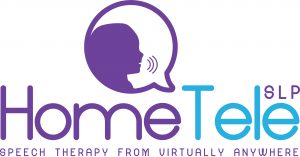


 Meridith Rose, MS, CCC-SLP is a pediatric speech-language pathologist and owner of HomeTele SLP, which was founded in June 2020. She was inspired to become a speech-language pathologist over 20 years ago, following her youngest brother’s diagnosis with an autism spectrum disorder.
Meridith Rose, MS, CCC-SLP is a pediatric speech-language pathologist and owner of HomeTele SLP, which was founded in June 2020. She was inspired to become a speech-language pathologist over 20 years ago, following her youngest brother’s diagnosis with an autism spectrum disorder.
Her passion to help her brother and other children with communication and neurodevelopmental disorders led to her receiving her Bachelor of Arts degree in Communication Sciences and Disorders from the University of Florida, Master of Sciences degree in Speech-Language Pathology and Audiology from Florida Atlantic University, and Applied Behavior Analysis program certificate from Florida Institute of Technology.
She has 15 years of experience as a Florida and Georgia licensed and certified Speech-Language Pathologist, and has served neurotypical and neurodiverse pediatric populations ages 2-18 with various communication disorders and exceptionalities in a variety of settings (e.g., schools, daycares/preschools, clinics, homes). Her background in Applied Behavior Analysis (ABA) has been instrumental in her speech and language therapy treatment approaches (e.g., positive reinforcement, facilitation of oral language development).
Throughout her career she has developed an immense passion for her work. She strives to improve her clients’ communication skills through the implementation of fun yet functional therapy activities that are culturally responsive, in their school or home environment via tele-therapy. Understanding the importance of the generalization of learned skills, she works closely with her clients and their families to provide them with strategies and supports to aid in the transfer of communication skills across environments.
As a lifelong learner, She is continually seeking opportunities to grow professionally. She is currently a doctoral student, graduate research assistant (GRA), and GaLEND Fellow at Georgia State University, where she is pursuing a Doctor of Philosophy (Ph.D.) in the Education of Students with Exceptionalities.
Free 30-minute consults that can be scheduled by visiting the website www.HomeTeleSLP.com
Connect with Meredith on LinkedIn.
What You’ll Learn In This Episode
- The start of HomeTele SLP
- HomeTele SLP – as a business
- SLPs do in their work with children (Communication Disorders)
- Target audience
This transcript is machine transcribed by Sonix
TRANSCRIPT
Intro: [00:00:03] Broadcasting live from the Business RadioX studios in Atlanta, Georgia. It’s time for Atlanta Business Radio, brought to you by on pay. Built in Atlanta on pay is the top rated payroll and HR software anywhere. Get one month free at unpaid. Now here’s your host.
Lee Kantor: [00:00:31] Lee Kantor are here, another episode of Atlanta Business Radio. And these are my very favorite ones. These are the GSU ENI radio episodes where we spotlight folks coming either through or around the GSU ENI program. Today on the show we have Meredith Rose with HomeTele SLP. Welcome, Meridith.
Meridith Michelle Rose: [00:00:53] Hi, Good morning, Lee. How are.
Lee Kantor: [00:00:54] You? I am doing well. I’m so excited to learn what you’re up to. Tell us about your company. How are you serving folks?
Meridith Michelle Rose: [00:01:01] So HomeTele SLP provides speech, language evaluations and speech language therapy via tele therapy. And it is person centered, family centered and culturally responsive. So we provide those services to pediatric populations ages 3 to 18 and both the states of Georgia and Florida.
Lee Kantor: [00:01:22] So what was kind of the genesis of the idea? How did you get started with this?
Meridith Michelle Rose: [00:01:27] Well, it’s kind of funny, actually. My journey to becoming a speech language pathologist started over 20 years ago following the diagnosis of my youngest brother’s, his diagnosis with autism spectrum disorder. And so that’s where my journey towards speech language pathology started. And I had a strong passion and not only helping my brother to communicate, but children like him. And so I’ve been a pediatric speech language pathologist for the past 15 years and have often worked privately outside of a full time job in providing services to children and their families. However, the pandemic changed that a little bit, and so I had to pivot from providing in-home services to tele therapy services. So that was the genesis of Home Tele SLP.
Lee Kantor: [00:02:15] Now, what is kind of so how does the practice work? So a person has a child that is suffering or needs some help in this area and they contact you. And then is this kind of just online or how are you communicating with them and how does it work?
Meridith Michelle Rose: [00:02:32] Yes. So parents will often reach out to me. I have free 30 minute consults that I provide to parents of children who may have a communication disorder, but children who have a speech or language disorder pretty easy to identify. A parent may notice that their child produces speech that is unclear. Or maybe they have a younger child and they’re not making sounds or gestures, or they’re using very few words. They’re not easily understood or they have difficulty understanding others. Or perhaps it’s more so about their social skills or even older kids. Maybe they have trouble with their writing skills and having conversations, conversational skills. So typically a parent will reach out to me for a console, we’ll schedule an evaluation, and then from there we start treatment.
Lee Kantor: [00:03:22] Now, in your work, when you’re working with a child, what are some of the activities that are going to go on during the kind of the work that you’re doing?
Meridith Michelle Rose: [00:03:33] So depending on the child’s area of weakness, we’re going to target those areas by developing individualized goals. So let’s say the child is having difficulty with their receptive language skills following directions. We work on skills that help with that area or, for example, expressive language skills. Maybe they have difficulty answering questions or who, what, where questions, or even just putting words together in a fluid manner. So we help with both expressive, receptive language skills, social skills and writing skills, oral language skills and writing skills as well.
Lee Kantor: [00:04:16] Now, is there something that it’s an everyday thing, every week thing? Does it take forever to like, is this a lifelong journey or is sometimes your work can help people kind of get over the hump and then they can do some self work on their own and just improve organically over time?
Meridith Michelle Rose: [00:04:35] Every child is different. No child is exactly the same. And so some children have communicate communication disorders that are mild in terms of their severity. Others may have moderate to severe disorders. So every child’s treatment plan is different, but typically a child may receive 30 minute sessions twice a week, once a week, depending on if they’re progressing in their session time or I’m sorry, and their therapy session. So the time will change depending on that child in terms of how long they’re in therapy, that is something that also depends.
Lee Kantor: [00:05:15] Now when they’re working for you, is this something that the child like enjoys? Is this something that becomes a something that’s fun for the child? Because I remember with my child he was having some speech issues. When he was very young and he worked with the school speech pathologist and he loved it like he it was like one of the favorite parts of his day. So do you kind of create your therapy in an enjoyable manner for the children? Or is this something like, Oh, I got to do this?
Meridith Michelle Rose: [00:05:45] Absolutely. It is enjoyable. We focus on providing therapy that is fun and functional. So while we are targeting goals and objectives to help improve the child’s communication skills, we’re also implementing positive reinforcement. And so by knowing what things interest the child, those interests can be incorporated into our therapy sessions to increase engagement.
Lee Kantor: [00:06:10] Now, is this something that affects a lot of children and maybe goes undiagnosed and they don’t take it seriously? But if you I would imagine if you kind of nip it at the butter early, you’re really going to have a lot of benefits for the child moving forward.
Meridith Michelle Rose: [00:06:24] Yes, that is true. Early intervention is always key. According to the National Institute of Health. We know that nearly one in 12 or 7.7% of us children between the ages of three and 17 has a disorder that’s related to speech, language, voice or swallowing. So these are disorders that impact a lot of our children.
Lee Kantor: [00:06:48] And then is it something that usually the parent identifies this or the pediatrician, or is it the the teacher or somebody at their school?
Meridith Michelle Rose: [00:06:58] During for example, you mentioned a pediatrician during an annual physical, a pediatrician may ask the parent questions related to their child’s speech and language. And during those conversations, that child may be referred, if not a parent, may just have concerns having had having other children in their family. So maybe their child is the youngest. So they know that developmentally there are milestones that their child may not be meeting as early as their their other children. So that may be something that prompts them to explore whether or not therapy is needed. And as you also mentioned, teachers in our educational system, they are very keen on knowing if there’s something happening at times related to speech and language that may be impacting that child academically. And so oftentimes in the school systems, referrals are also made.
Lee Kantor: [00:07:51] Now, in your work, can you share a story maybe of a child that came to you obviously don’t name their name, but maybe share what the challenge was and how you were able to help them get to a new level.
Meridith Michelle Rose: [00:08:02] Oh my goodness. There are so many, so many children. If I could think of one, there was a child who had a very difficult time and producing clear speech. This child had a proxy of speech and a lot of his vocalizations consisted of vowels. So there weren’t a lot of consonant sounds which made it which made it hard to decipher what he was trying to say. And it was very amazing because over a six month period of time he went from using vowels to using syllables to using words, the phrases, the sentences. And it’s just so exciting to see a child make progress in a way that impacts not only their ability to make their wants and needs known, but it also is very affirming for the family to see that their child is able to communicate with them and their peers and their family.
Lee Kantor: [00:09:08] Now, this must be such a rewarding work for you to be able to make that kind of impact, like you said, not just on the child, but on the family as well. And it could change the whole trajectory of that child’s life if they kind of can take care of this early and really get the improvement that you described it. You must feel really good every day waking up and doing this kind of work.
Meridith Michelle Rose: [00:09:33] It’s extremely rewarding. I have a few families that have kept in contact with me over the past 15 years, students that I worked with when they were a preschool age that are now in college or in the military. And it’s just been really nice to see over the years. Some of these families have kept in contact with me and reached out to me if their child needed assistance here and there. It’s just a beautiful, beautiful thing to witness, a wonderful profession to be a part of. And I consider it a blessing to be able to impact the lives of children and their families.
Lee Kantor: [00:10:14] Now, how did you get involved with the Main Street fund? How did that get on your radar?
Meridith Michelle Rose: [00:10:19] I remember learning about Main Street and specifically and I through Fujitsu during my graduate student orientation fall of last year. And so it all started there. And once I found out that they were accepting applications for their third cohort, I applied and and here I am.
Lee Kantor: [00:10:41] Now, what have you gotten out of it? Has this been helpful as you grow your business?
Meridith Michelle Rose: [00:10:45] Yes, this has been extremely helpful. I’ve received a lot of coaching to help me with identifying my customer. I’ve received a lot of help financially, even with my business, to help me to get it off the ground and to start to gain traction. I’ve learned quite a bit about how to pitch my business, and so everything that I’ve learned over the past six months in Main Street has been, I think, very instrumental to where I am now.
Lee Kantor: [00:11:18] So what do you need more of? How can we help you?
Meridith Michelle Rose: [00:11:21] I need more exposure. I need for people to know about home tele SLP, what we do, why we’re here, and we’re here to help.
Lee Kantor: [00:11:32] And if somebody wants to learn more, what’s the website? What’s the best way to find you and get a hold of you to have a more substantive conversation?
Meridith Michelle Rose: [00:11:39] Our website is home tele slp ph0etel slp dot com and you can follow us on social media at home tele slp.
Lee Kantor: [00:11:54] And that’s home. E. T e. L e slp dot com.
Meridith Michelle Rose: [00:11:59] That is correct.
Lee Kantor: [00:12:00] Well, Meredith, congratulations on all the success and the momentum. You’re doing such important work and we appreciate you.
Meridith Michelle Rose: [00:12:07] Thank you so much for your time, Lee.
Lee Kantor: [00:12:09] All right. This is Lee Kantor. We’ll see you next time on Gesu e anni radio.
Intro: [00:12:18] Today’s episode of Atlanta Business Radio is brought to you by On pay. Built in Atlanta on pay is the top rated payroll in HR software anywhere. Get one month free at onpay.com.
About Our Sponsor
OnPay’s payroll services and HR software give you more time to focus on what’s most important. Rated “Excellent” by PC Magazine, we make it easy to pay employees fast, we automate all payroll taxes, and we even keep all your HR and benefits organized and compliant.
payroll services and HR software give you more time to focus on what’s most important. Rated “Excellent” by PC Magazine, we make it easy to pay employees fast, we automate all payroll taxes, and we even keep all your HR and benefits organized and compliant.
Our award-winning customer service includes an accuracy guarantee, deep integrations with popular accounting software, and we’ll even enter all your employee information for you — whether you have five employees or 500. Take a closer look to see all the ways we can save you time and money in the back office.














